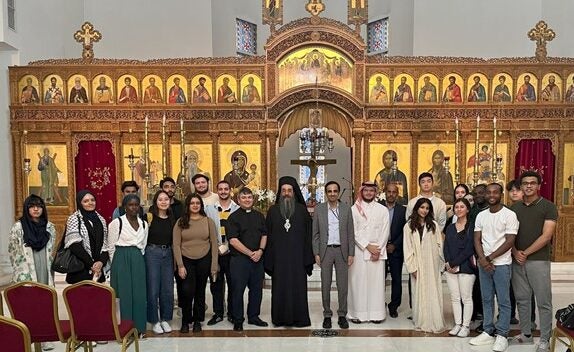Students Embark on Interfaith Discovery at Qatar Religious Complex
In the spirit of Georgetown University’s dedication to interreligious understanding, a group of thirty GU-Q students, led by Visiting Associate Professor Dr. Josef Meri, embarked on an insightful study trip to the Religious Complex in Abu Hamour. This trip, a key component of two undergraduate courses – History of Religions and Religious Pluralism in the Middle East and Islamic World, taught by Dr. Meri, offered students an immersive experience into the core of religious diversity and peaceful coexistence in Qatar.
The Abu Hamour Religious Complex is a hub of worship for different faiths with six main churches and nearly a hundred smaller religious groups.
Archbishop Makarios of the Greek Orthodox Church and the most senior clergy in Qatar, welcomed the students, offering his perspective on the complex’s role in fostering interfaith dialogue and understanding, going beyond peaceful coexistence to nurture a deep respect for diverse faith traditions.

Wilbert Fils Pierre-Louis, a second-year student studying Culture and Politics, steered the conversation toward the challenges of practicing Christianity in a predominantly Muslim country. “I was particularly struck by hearing the Archbishop candidly recount his initial struggles about finding a place to pray before the Qatari government granted land for diverse worship spaces. It opened my eyes to the complexities of religious freedom and cultural adaptation.”
Rev. Mark Derry, the head of the Anglican Centre, who is originally from South Africa, also shared his story, explaining how his initial culture shock was the start of his own journey toward understanding, acceptance, and mutual respect. “His story resonated deeply with the students,” recalled Wilbert.

“Most of our students have had the opportunity to define their identities and articulate their beliefs during their travels, or in interaction with the highly diverse community at Georgetown,” explained Dr. Meri, who is also an Associate at the Georgetown University Prince Alwaleed Center for Muslim-Christian Understanding. “The visit offered additional evidence of the importance of cultural sensitivity and the role it plays in cultivating a welcoming community for all religions. Students also gained a more nuanced understanding of the delicate balance between maintaining one’s cultural identity and adapting to new cultural norms.”
In the Religious Pluralism course, which included two cross-registered students from Northwestern Qatar, students also learned how to conduct historical research and interviews about challenges to religious pluralism. The course assignments included researching and writing a case study that can be used for teaching future courses about religious pluralism, encouraging them to use their growing understanding to foster even further interreligious engagement and learning. Exceptional case studies about the region and Muslim communities in Europe and Canada will be included in the archive of the “Education City Religious Pluralism Case Study Initiative,” led by Dr. Meri.
For the participating students, seeing the religious diversity firsthand, and understanding the importance of laws, policies, and spaces that protect the freedom to worship, was an important learning experience. “The course offered more than an academic outing and classroom learning,” commented Wilbert, “it left a lasting impression and taught me an invaluable lesson about what it means to be a global citizen.”
About the Course
Religious Pluralism in the Middle East and Islamic World (THEO-3920-70) is an interdisciplinary course which explores religious pluralism globally, with a focus on Middle Eastern and Islamic societies. Students critically analyze models of religious diversity, contemplate a unique model for these contexts, create case studies, and produce brief documentaries.